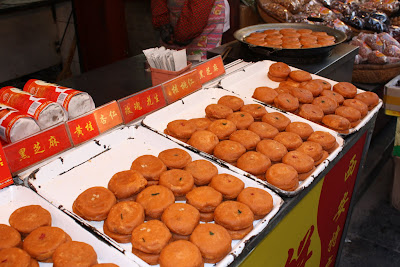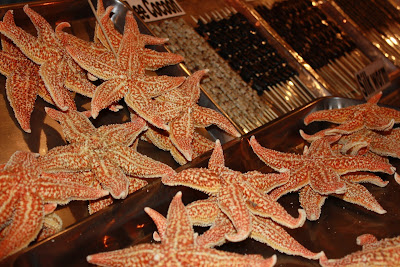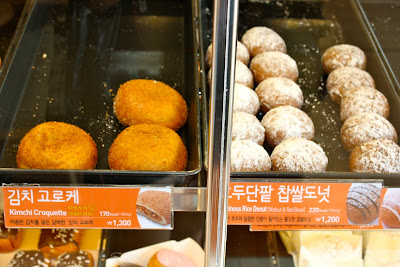

Wang Mandu means "king dumpling" in Korean. A more literal translation would be "huge steamed bun filled with pork, clear noodles and green onions." The perfect option when you're on the go, craving dumplings.
Here's a food-obsessed visual summary of the trip:
First stop: Shanghai's Old Town for some dumplings.

They were everything I wanted them to be: perfectly packaged presents, filled with minced pork and chives.
















This morning, I stopped by Dunkin’ Donuts for a bagel and cream cheese. “I am sorry, no bagels. No cream cheese,” said the woman behind the counter.
“Seriously?” I felt like asking. “This would never happen in the states—especially not at 9 a.m. on a weekday.”
But I bit my tongue and thanked her in Korean.
On my way out, I took a picture of what they did have to offer: kimchi croquettes and glutinous rice donuts.

 Soft rock band Chicago once sang, “You bring meaning to my life, you’re my inspiration…” Sure, they were probably talking about some busty brunette; but hey, everyone’s different. The love of my life just so happens to be a pig.
Soft rock band Chicago once sang, “You bring meaning to my life, you’re my inspiration…” Sure, they were probably talking about some busty brunette; but hey, everyone’s different. The love of my life just so happens to be a pig.I had been fantasizing about this particular pig since my co-teacher found out I was going to Jeju Island—the Hawaii of Korea—for my summer break. In true Korean fashion, she had stopped by the tourist office and picked up pamphlets, maps, and books to help me enjoy my stay.
I began flipping through the pages later that night, planning the trip: waterfalls, lava tubes, beaches, hiking. When suddenly, my eyes fell on a section marked, “A Taste of Jeju: Truly Authentic and Truly Appetizing.” Colorful, glossy pages full of raw seafood delicately placed next to artfully carved vegetables. A variation of fish stews and porridges. Buckwheat pancakes and local pheasant shabu shabu. And something called Heukdoeji—grilled slices of black pork.
“Indigenous Jeju black pork has long been one of the essential elements of energy and nutrition for the people of Jeju. Jeju grass-fed pork is renowned for its finely textured, light-colored meat and its abundance of high quality fatty acids. Don’t miss the opportunity to try the delectable grilled black pork.”
There was no way I was missing it.
***
Day one on Jeju Island, and all I could do was talk about pork. “We’ll check in to our hotel, put
 down our luggage, maybe check out those waterfalls, then have that black pig dinner,” I told my traveling companion, Chris.
down our luggage, maybe check out those waterfalls, then have that black pig dinner,” I told my traveling companion, Chris. “You are a woman obsessed,” said Chris. “Do you know which restaurant you want to go to?”
“No, but I will,” I responded.
A few hours later, after viewing the beautiful foliage and meeting some new friends over beers, it was time to find the restaurant. “I’ll let my nose lead the way,” I said.
But as soon as we started walking, a team of soccer players with red faces and full bellies stumbled around the corner. They reeked of pig.
“I think we found our place!” I exclaimed.
We walked inside what looked like an abandoned log cabin, finding hundreds of people crammed around grills on wooden floors. Soju (Korea’s version of vodka) was being passed around tables. The smell of succulent pork permeated the air. Some old woman scurried over to an empty grill and signaled for us to come over.
It was time.

Seasoned with sesame oil and sea salt, grilled to perfection, wrapped in lettuce and dipped in hot pepper sauce. My mouth watered and I began to feel light-headed. “This is the most perfect food I have ever eaten,” I said, almost in tears.
Everyone nodded their heads, unable to speak.
“Would it be completely absurd to order another plate of pork?” asked my friend Chris, while scraping the grill for remnants of charred meat.
Our new friends called the waitress over, and ordered another plate. “To the Jeju black pig!” they cheered, raising their shots of soju. “To the Jeju black pig!”